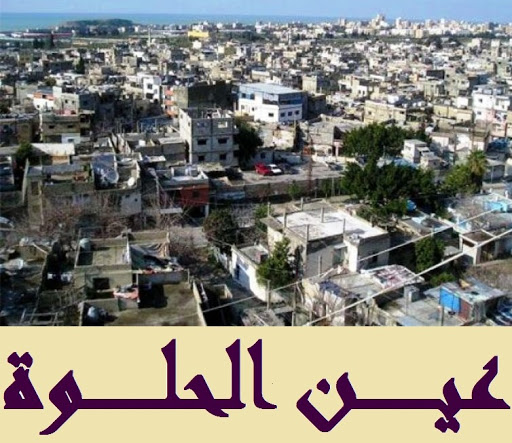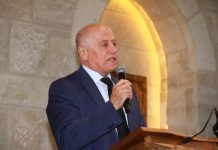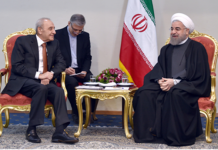What Has the Palestinian Authority Done to Solve the Refugee Crisis Since Camp David?
Colonel Charbel Barakat/February 04/2025
(Free translated from Arabic and summarizing introduction by: Elias Bejjani)
ماذا فعلت السلطة الفلسطينية لحل مشاكل اللاجئين في مناطقها منذ اتفاقات كمب ديفيد؟
الكولونيل شربل بركات/04 شباط/2025
يدّعي الكثير من “المتفلسفين” خاصة في الوسط اليساري “المثقف” داخل وخارج لبنان بأن الدولة اللبنانية لم تسهم باستيعاب اللاجئين الفلسطينيين ولا بحل مشاكلهم، وبالتالي فلهم الحق أقله بتنظيم الأمن داخل المخيمات والحفاظ على اسلحتهم. ومع أننا نعرف بأن سوريا والاردن ومناطق الضفة والقطاع تضم عددا أكبر من المخيمات الفلسطينية، فهل لهؤلاء الحق بتنظيم الأمن داخل مخيماتهم كما هو الوضع في لبنان؟
بالتفاصيل وبحسب جداول الأنروا فإن أعداد اللاجئين الفلسطينيين في الدول المجاورة هو كالتالي:
سوريا 450 الف موزعين على 11 مخيم قبل الحرب السورية
الأردن 450 الف موزعين على 13 مخيم قبل ايلول الأسود
لبنان 180 الف موزعين على 15 مخيم قبل حرب 1975
الضفة الغربية 800 الف موزعين على 24 مخيم
قطاع غزة 400 الف موزعين على 8 مخيمات
إذا مشكلة اللاجئين الفلسطينيين الاساسية تتلخص بحوالي مليون لاجئ في دول الجوار أي سوريا والأردن ولبنان وحوالي مليون ومئتي الف داخل المناطق التي من المفترض أن تديرها السلطة الفلسطينية. بالمقابل وبحسب الدراسات العربية فإن ما مجموعه 900 ألف يهودي هربوا من الدول العربية بعد قيام دولة اسرائيل تم استيعاب 600 الف منهم داخل اسرائيل بينما هاجر 300 الف إلى فرنسا والولايات المتحدة وبلاد أوروبية أخرى.
لقد فرضت سوريا الأسد على لبنان تجنيس نصف مليون شخص لم يكن بينهم أي من فلسطينيي المخيمات على ما يبدو، ونفس النظام جنّس خمسة ملايين من جماعة إيران ومن الافغان والباكستانيين وغيرهم من الشيعة الذين فرضتهم إيران لتغيير الديمغرافيا في سوريا لصالح الأقلية الشيعية بدون أن يرمش له جفن، بينما كان الفلسطينيون في مخيمات سوريا يتعرضون للاضطهاد. واليوم قد ينزع النظام الجديد الجنسية عن كل هؤلاء بدون أن يجرؤ الحكم اللبناني على المساءلة حول عملية التجنيس الجماعية التي جرت في ظل نظام الأسد، لا بل قد يضطر، تحت ضغط إيران وأزلامها في لبنان، لاستيعاب هؤلاء الخمسة ملايين (مؤقتا) لتنظيم نقلهم إلى إيران، بحسب ما طلب مساعد وزير الخارجية الإيراني في آخر زيارة له، ما سوف يبقيهم إلى الأبد كمشروع فتنة داخل البلد، الذي لم يكفه ما قام به نظام الأسد من تهجير مليونين من شعبه إليه، ولم يزل الكثير منهم بالرغم من المتغييرات يقيم في مخيمات ترعاها الأمم المتحدة. فهل من دولة في لبنان تستوعب ما يجري وتقوم بما يجب عليها القيام به، أي اغلاق الحدود بوجه كل هؤلاء وتنسيق اعادتهم إلى إيران عبر العراق مثلا؟ وهي عملة أسهل بكثير من لبنان ولا تحتاج الا إلى الباصات نفسها لتصل برا بهم ومباشرة إلى المصدر أي إيران؟.
بالعودة إلى موضوعنا خاصة بعد مآسي حرب غزة الأخيرة وضرورة العمل على حل مشاكل الاكتظاظ السكاني فيها، فإننا نتساءل عن مسؤولية عرفات ومن بعده أبو مازن رئيس السلطة الفلسطينية ومن تسمي نفسها منظمة حماس، الذين تسلّموا ادارة البلاد على التوالي، ماذا فعلوا للتخفيف عن معاناة الفلسطينيين المهجّرين في الحرب التي قادتها الدول العربية والفلسطينيين أنفسهم سنة 1948، بعد رفضهم لمشروع التقسيم الذي كانت تبنّته الأمم المتحدة يومها بموجب القرار 181 لمجلس الأمن الدولي، والذي يعطي العرب الفلسطينيين واليهود الاسرائيليين مناطق نفوذ في البلاد ترعاها الأمم المتحدة، حيث كان بالامكان التنسيق بين المجموعتين لمنع الاعتداءات وبقاء السكان في أماكنهم، لا بل اقامة علاقات جيدة بين الجيران قد تحسن أوضاع السكان في المناطق بدون اللجؤ إلى الحروب والمآسي.
ماذا فعل عرفات منذ توقيع اتفاقية أوسلو سنة 1993 حتى مرضه سنة 2003 أي عشر سنوات أعطي خلالها قيادة المناطق الفلسطينية في الضفة والقطاع، حيث انسحب الاسرائيليون خلالها من 13 مستعمرة داخل قطاع غزة وحدها، وأخضعت غزة والضفة بكاملهما للسلطة الفلسطينية، وتدفّقت أموال المساعدات العربية والأجنبية؟ وماذا فعل أبو مازن من بعده، والذي لم يزل حتى اليوم يقود السلطة الفلسطينية في الضفة؟ هل تم استيعاب أي من سكان هذه المخيمات واسكانهم مكان المستعمرات اليهودية ال(13) التي ازيلت من مناطق داخل قطاع غزة؟
من المؤكد بأن البنايات التي دمرت في غزة في الحرب الأخيرة وكانت مؤلفة من عشرات الطبقات كانت تستوعب عائلات بعضها من سكان المخيمات، لكن اليهود الذين قدموا إلى اسرائيل لم يسكنوا سوى فترات قليلة في مخيمات ثم نقلوا إلى قرى أو مدن انشأت بأموال من الدولة او المنظمات اليهودية وبمشاركة المهجرين أنفسهم عندما أصبحوا منتجين يعملون في وظائف تساهم في اسكانهم في أماكن مقبولة، ولم يعد هناك اي شكل من اشكال المخيمات داخل اسرائيل، ولا نقول بأن الفلسطينيين غير قادرين على العمل المنتج وليسوا بأهلا لتملّك بيوتهم ودفع ثمنها، لو أن السلطة الفلسطينية مثلا قررت القيام بمشاريع اسكانية بأموال تسهم فيها بعض الدول العربية أو الأجنبية وتقوم على الأراضي الفلسطينية، فهل تم أي شيء من هذا القبيل؟ أم أننا لا نزال نريد اثبات “حقنا الضائع بالارض السليب” وبالتالي يجب أن يبقى الفلسطينيون مشردون يعانون من السكن في مخيمات لا تليق بالانسان ولا تحترم حقوقه، لكي نربي أفواج جديدة من الحاقدين الذين يمكن تجنيدهم في اي وقت ودفعهم للقيام بأعمال تقلق الاسرائيليين والعالم الحر وتجبرهم على دفع الخوة؟
لو أن عرفات أو أبو مازن أو حتى حركة حماس قاموا باستيعاب اللاجئين في مناطقهم وحولوهم إلى طاقات منتجة، لكان من السهل الوصول إلى حلول بالنسبة لبقية فلسطينيي الشتات، ولكن أن يبقى الفلسطينيون يحلمون بالاستيلاء على ما عمله الاسرائيليون بالقوة وفقط لأن لهم حق العودة، فهذا موضوع يصعب تقبّله. ويوم اقترح كوشنير، صهر الرئيس ترامب خلال فترة رئاسته الأولى، توسيع غزة باتجاه سيناء، وبناء مرفأ تجاري على المتوسط داخل الأراضي المصرية، مع خطوط نقل باتجاه خليج العقبة حيث تصل البضائع من الخليج العربي عبر السعودية إلى العقبة فسيناء لتنقل إلى اوروبا عبر ميناء غزة الكبيرة ((Greater Gaza ما قد يؤمن آلاف الوظائف ويفتح مجالات عمل مهمة تستوعب، ليس فقط فلسطينيي القطاع انما أيضا فلسطينيين كثر من الضفة الغربية والداخل الاسرائيلي، وتربح مصر، التي ستسهم بفتح الممر التجاري في أراضيها، ضريبة المرور، فلا تتأثر مداخيلها من تحوّل جزء من التجارة العالمية إلى هذا الممر الجديد، الذي قد يأخذ ربما جزءً مما يمر عبر قناة السويس، لم يرض الفلسطينيون ولا المصريون. فهل بعد دمار غزة على يد حماس وأزلامها واغلاق البحر الأحمر من قبل الحوثيين حيث توقّف العمل بشكل كبير في قناة السويس سيقبل المصريون والفلسطينيون بالحلول؟
العرب يتخلفون دوما عن الركب وليست لهم المقدرة ربما على تصور الأمور قبل حدوثها، ولذا فهم دوما يقبلون متأخرين بما كان معروضا عليهم ورفضوه. فهل سيستوعبون في فترة حكم ترامب الثانية أهمية الحلول الكبرى، خاصة بعد ما جرى في غزة ولبنان، وما سيتغير حول الشرق الأوسط بكامله؟
What Has the Palestinian Authority Done to Solve the Refugee Crisis Since Camp David?
Colonel Charbel Barakat/February 04/2025
(Free translated from Arabic and summarizing introduction by: Elias Bejjani)
Introduction
For decades, the Palestinian refugee crisis has been deliberately prolonged by Arab regimes and Palestinian leadership, not for humanitarian reasons but as a political weapon. While Israel successfully integrated Jewish refugees from Arab countries, the Palestinian Authority, Hamas, and Arab states have refused to do the same for Palestinians, leaving them in dire conditions to serve an agenda of perpetual conflict. This piece examines the failure of Palestinian leadership to absorb refugees despite massive international aid, the demographic manipulations imposed by Iran and Syria, and the missed opportunities—such as Trump’s Greater Gaza plan—that could have provided real solutions. As the region faces new realities, will Arab leaders finally accept pragmatic solutions, or will they once again reject progress until it’s too late?
Many so-called “intellectuals,” especially among the leftist elites inside and outside Lebanon, claim that the Lebanese state has not done enough to absorb Palestinian refugees or solve their problems. They argue that, at the very least, Palestinians have the right to organize security inside their camps and maintain their weapons. But while we know that Syria, Jordan, the West Bank, and Gaza host far more Palestinian refugee camps than Lebanon, do Palestinian refugees in these regions have the same “right” to armed autonomy? The answer is a resounding no.
According to UNRWA data, Palestinian refugee numbers in neighboring countries are as follows:
Syria: 450,000 across 11 camps (before the Syrian war)
Jordan: 450,000 across 13 camps (before Black September)
Lebanon: 180,000 across 15 camps (before the 1975 war)
West Bank: 800,000 across 24 camps
Gaza Strip: 400,000 across 8 camps
The real refugee crisis is not in Lebanon but in Syria, Jordan, and even within the Palestinian territories themselves, where approximately 1.2 million refugees live under the Palestinian Authority’s jurisdiction. Meanwhile, history shows how other refugee populations were integrated: after Israel’s establishment, 900,000 Jews fled Arab countries, with 600,000 absorbed into Israel and the rest settling in France, the United States, and elsewhere.
Yet while the Assad regime in Syria forcibly naturalized half a million people—none of whom were Palestinians—it simultaneously facilitated Iran’s demographic engineering, allowing the mass settlement of five million Iranians, Afghans, and Pakistanis in Syria to shift the country’s sectarian balance. Palestinian refugees in Syria’s camps, on the other hand, faced persecution. Now, under pressure from Iran and its Lebanese proxies, Lebanon may be forced to absorb these five million settlers temporarily, only for them to remain permanently as a ticking time bomb within Lebanese society.
The Palestinian Authority’s Failure
In light of Gaza’s recent destruction and its population crisis, we must ask: what have Yasser Arafat, Mahmoud Abbas, and Hamas done to alleviate the suffering of Palestinian refugees since 1948? The original Palestinian displacement was the result of Arab rejection of UN Resolution 181, which proposed a peaceful partition of the land. Instead of cooperation, they chose war, leading to decades of suffering.
Arafat had ten years between the Oslo Accords (1993) and his death in 2004, during which Israel withdrew from 13 settlements inside Gaza and placed the entire Gaza Strip and much of the West Bank under Palestinian Authority control. Foreign aid poured in, yet did the Palestinian Authority relocate or integrate even a fraction of the refugees? Did Abbas, who has ruled the West Bank for nearly two decades, do any better? Did Hamas, after seizing control of Gaza, use its resources to build homes, or did it dig terror tunnels and amass rockets instead?
By contrast, Jews who fled Arab countries after 1948 spent only a short time in refugee camps before integrating into cities and towns, often funded by state or community initiatives. There is no such thing as a Jewish refugee camp today. If Palestinians were truly seeking progress, why hasn’t the Palestinian Authority used Arab and international funding to build housing projects on Palestinian land?
The reality is that keeping Palestinians in camps serves a political agenda—one that ensures generations of resentment, providing a continuous supply of recruits for violence against Israel and the West. If the Palestinian leadership had genuinely prioritized refugee resettlement, the entire issue could have been resolved decades ago.
Missed Opportunities and the Road Ahead
Jared Kushner’s Greater Gaza proposal under Trump’s first term envisioned a massive commercial port in northern Sinai, linked to the Gulf of Aqaba via Saudi Arabia, creating a major trade corridor to Europe. This plan would have generated thousands of jobs and provided economic relief not only to Gazans but also to West Bank Palestinians and even Egyptians. Yet, true to form, both Palestinian and Egyptian leadership rejected the idea.
Now, after the destruction of Gaza by Hamas’s reckless war and the Red Sea’s closure by Houthi terrorists, which crippled the Suez Canal trade route, will Egypt and the Palestinians finally acknowledge the need for pragmatic solutions? Or will they, as always, dismiss opportunities until it’s too late?
The Arab world has a long history of rejecting solutions only to demand them later when circumstances become unbearable. Will they understand, in Trump’s second term, the importance of real solutions after what happened in Gaza and Lebanon? Or will they continue down the same path of self-destruction?
Colonel Charbel Barakat
***Colonel Charbel Barakat, a retired Lebanese Army officer, historian, terrorism expert, and author of numerous works on Lebanon, the Iranian regime’s schemes, and jihadist movements, has testified multiple times before the U.S. Congress on critical issues, including Iranian and Syrian terrorism, the Syrian occupation of Lebanon, jihadist threats, and the pursuit of Middle East peace.






















